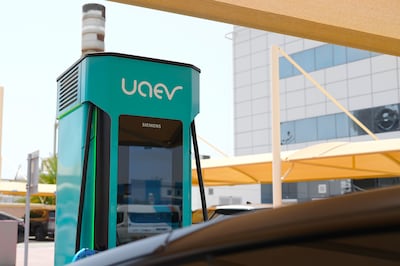The 2024 Electric Vehicle Innovation Summit (Evis) taking place in Abu Dhabi comes at a critical time as the world seeks to reach net zero emissions by the year 2050, the UAE Ministry of Energy and Infrastructure’s undersecretary for energy and petroleum affairs said on Monday.
“As government, we play an active role in increasing the penetration of electric vehicles, by building and integrated, robust and accessible charging network linking all the seven emirates,” Sharif Al Olama said, noting that currently, 3 per cent of all vehicles on UAE roads are electric and hybrid.
“Our aim is to increase the speed and pace of the shift to green mobility through raising the share of EVs to 50 per cent of all vehicles on our roads by the year 2050,” he explained, referencing details of the National Electric Vehicles Policy approved by the UAE Cabinet in 2023.
“An all inclusive decarbonisation drive is a must to reach out collective goal, and that means promoting green mobility and reducing CO2 emissions from the transportation sector,” he added.
Also announced on the first of a three-day summit was a joint venture between the UAE Ministry of Energy and Infrastructure (MoEI) and Etihad Water and Electricity (Etihad We), called UAEV, a charging network fully owned and operated by the government.

Prototypes of UAEV’s electric chargers were visible on the exhibition floor packed with products from the electric vehicle sector.
“UAEV charging infrastructure will contribute to the modernisation of the UAE’s transport network, and help energise communities by creating new jobs, and empower our customers to make more sustainable choices,” said Yousif Ahmed Al Ali, chief executive of Etihad Water and Electricity.
Suhail Al Mazrouei, Minister of Energy and Infrastructure, reflected on the long-term hopes of the announcement.
“UAEV embodies the power of partnership between government and industry, and aims to provide vital electric vehicle infrastructure to boost adoption of EVs, energise communities and unleash the economic potential of the UAE,” he said.
More details about the UAEV charging stations and infrastructure project are expected to be announced by the end of 2024.

In addition to a backdrop of unprecedented climate concern, the 2024 gathering of electric vehicle manufacturers, battery and charging companies comes at a time of tremendous growth and competition throughout the electric transport industry.
The exhibition, on the third occasion it has been staged, seeks to increase dialogue on challenges faced by electric mobility sector.
“We are encouraged by the continued collaboration of industry leaders, policymakers and stakeholders gathered here,” Mr Al Olama said.
While the consumer sector of the EV market receives most of the overall attention, recently, electric freight technology has also made headlines.
In the UAE, global ports operator DP World and electric freight mobility company Einride recently announced a partnership that will result in the Middle East’s largest fleet of driverless electric cargo vehicles.
In 2023, Einride also signed an agreement with the UAE’s Ministry of Energy and Infrastructure in 2023 that will result in a 550km “Falcon Rise” freight mobility grid, with the eventual aim of enabling the use of electric and autonomous vehicles.
Heiko Seitz, e-mobility director leader for PwC Middle East, said that both the UAE and Saudi Arabia were “wave II” countries in terms of electric vehicle adoption, while other areas like the US, China and Europe were “wave I”.
“The UAE and Saudi Arabia are in a good position of being able to identify what worked and what didn’t work compared to those other countries,” he said, noting the potential advantages that lie ahead on the road to EV adoption.
“While they’re 10 years behind, you’re going to see this region come EV maturity much faster compared to other regions because you can skip the learning curve,” he said.
As a result, the EV ecosystem in the Middle East, according to Mr Seitz, will be one that’s more rapidly evolving, more profitable, and customer-centric ecosystem.
More than 200 exhibitors representing at least 50 countries are taking part in 2024’s Evis. According to organisers, more than 300 delegates and 110 speakers took part as well.
Lucid, Tam Motors, Chery and Zeekr were just some of the EV companies showcasing their automotive product lines at the exhibition.
Tesla, often viewed as one of the pioneering EV companies, was also present at Evis.
Though once seen as seemingly invincible, back in January, Tesla briefly lost the title as world’s largest EV seller to China’s BYD.
It also faces tough competition from companies like Rivian Automotive and Lucid Motors, as well traditional car makers which have also entered the EV market in recent years.
In April, after missing first quarter earnings expectations, the Texas-based electric vehicle manufacturer announced a renewed push for making “affordable” vehicles and company-wide cost-cutting measures.
That fierce competition, said Mr Seitz, might hurt profit margins, but ultimately will help with EV adoption.
“With more and more models coming in from different companies around the world, you’re going to see the total cost of EV ownership go down,” he said.
Updated: May 20, 2024, 2:33 PM
